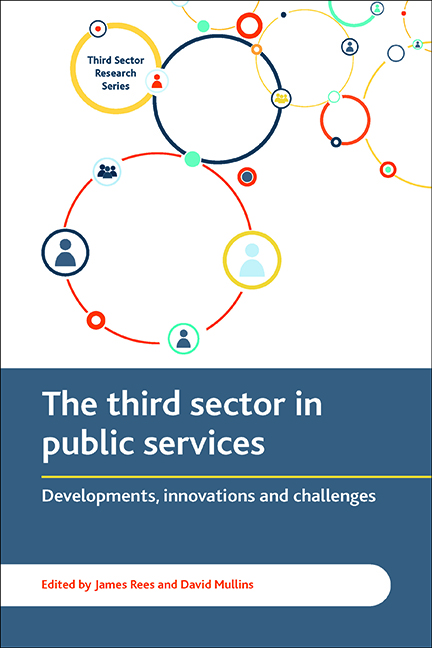Book contents
- Frontmatter
- Contents
- List of tables, figures and boxes
- Series editor’s foreword
- Notes on contributors
- one The third sector delivering public services: setting out the terrain
- Part One Policy, politics and organisations
- Part Two Cross-cutting issue for third sector service delivery
- Part Three Service delivery in key policy fields
- Index
two - The history of third sector service delivery in the UK
Published online by Cambridge University Press: 05 April 2022
- Frontmatter
- Contents
- List of tables, figures and boxes
- Series editor’s foreword
- Notes on contributors
- one The third sector delivering public services: setting out the terrain
- Part One Policy, politics and organisations
- Part Two Cross-cutting issue for third sector service delivery
- Part Three Service delivery in key policy fields
- Index
Summary
This chapter provides a short overview of the history of the developing role of third sector organisations in the delivery of public services in the UK. This is a long and complex history, made more so by some confusion over some of the key terms, which is explained and clarified below. The nature of third sector involvement in public services can be traced back over three centuries, and has been structured by broader changes in relations between the state and the third sector, which are discussed here as a series of phases of relationship change. The most recent ‘partnership’ phase has been associated in particular with the political and policy initiatives introduced by the recent Labour governments to both broaden and deepen government engagement with the sector. This has created opportunities, but also challenges, for third sector organisations involved in public service delivery, which are outlined here and taken up in more detail in some of the later chapters of the book.
Public services
What a review of the history of the role of third sector organisations in the delivery of public services reveals, therefore, is that this is a long history. It is a history in which this role has changed to adapt to the differing influences of economic pressures, policy shifts, user needs and new forms of practice. But the engagement of the sector, or rather elements of it, with the needs for and provision of public services is a deep-seated feature of the development of these services, extending over three centuries or more. Those who suggest that it has all come about in the last few decades of policy reform are therefore failing to appreciate this longer history, or choosing to ignore it. However, this is also a complex history; and at the root of this complexity is some confusion, or at least debate, over the meaning, or the application, of some of the key terms involved.
First, there are different understandings of what is included within the notion of public services, and in practice these need to be appreciated within this longer-term historical context. The most obvious, and the most extensive, understanding of public services is those services that are provided to the public, either collectively or (on an open access basis) to individuals.
- Type
- Chapter
- Information
- The Third Sector Delivering Public ServicesDevelopments, Innovations and Challenges, pp. 21 - 40Publisher: Bristol University PressPrint publication year: 2016

